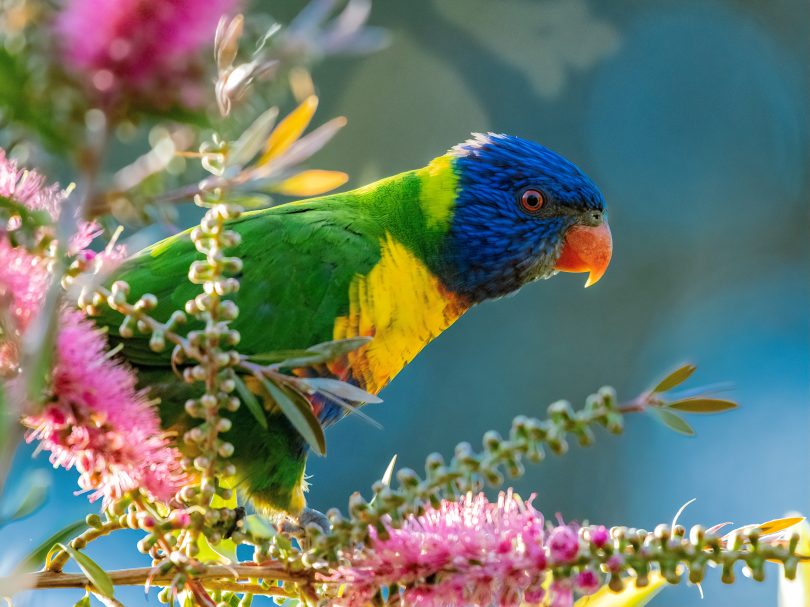
A rainbow lorikeet on a colourful branch. The birds are still dying in large numbers on the South Coast. Photo: Trevor McKinnon.
Although the mortality rate is decreasing, rainbow lorikeets are still dying in large numbers along the NSW South Coast months after a spate of deaths was first recorded.
WIRES is reporting the iconic birds are still being seriously afflicted by a bacterial infection in areas ranging from the South Coast to the Northern Rivers.
University of Sydney Wildlife and Conservation Professor David Phalen has been carrying out laboratory tests on the dead birds and has identified that an E.Coli infection is causing the deaths but the source is yet to be found.
WIRES Mid South Coast Joint Avian coordinator Janelle Renes said more than 100 rainbow lorikeets had come into care in the local branch with all showing infection symptoms and often resulting in their sudden deaths within hours of being rescued.
“It is very distressing for both the public and our volunteers to see these much-loved birds dying in such large numbers,” Ms Renes said.
“We would like to thank all those concerned residents for following veterinarian advice and not feeding native birds during this critical time, helping reduce the risk of ongoing cross-infection.”
Some of the rescued birds have also been identified as suffering from Psittacine beak and feather disease (PBFD).
Ms Renes believes the recent decline in the number of rainbow lorikeets coming into care is partly due to the cooler weather but also to the overwhelming public response to an appeal for people not to hand feed.
She said communal feeding stations were thought to be contributing to the spread of the disease.
“We’re not sure yet whether the bacteria is in something the birds are eating or drinking but the saddest part is because rainbow lorikeets are such social birds, they’re passing it on to each other very quickly,” she said.
“The sick birds are unable to fly, they are underweight and their claws are clenched. Some come in and seem to be OK and then just die.”
They are also more vulnerable to predator attack on the ground. A healthy lorikeet rarely falls victim to dogs and cats, but WIRES has seen an uptick in these injuries as well.
WIRES is working closely with researchers to try and identify the source of the disease.
Years of drought followed by the Black Summer bushfires may have resulted in more people providing food for local birds which are struggling to find any other source.
WIRES is continuing to plead with them to stop and instead plant natives in their gardens to attract birds in a natural way.
If you see a bird showing symptoms of infection such as an inability to fly, walking awkwardly or staggering, or even hunched over on a low-hanging branch call WIRES on 1300 094 737 or report online at www.wires.org.au.







